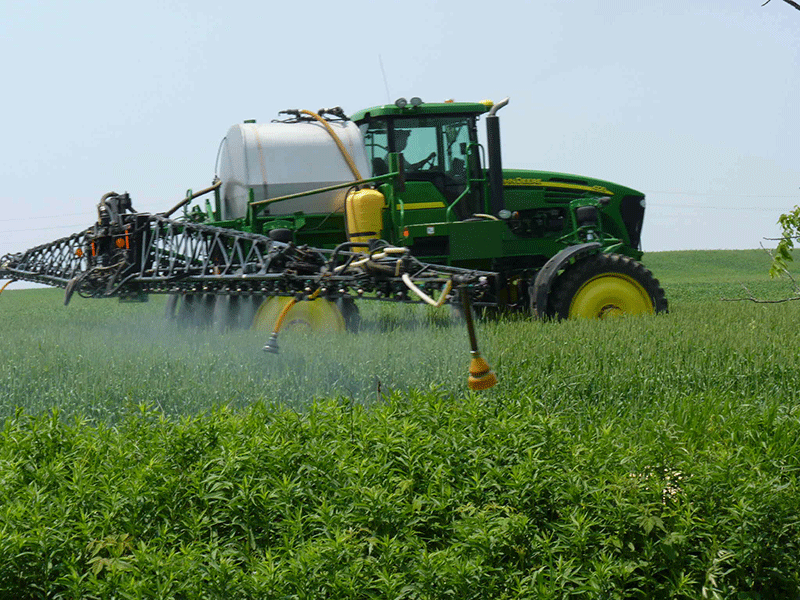The “future” of glyphosate
POTENTIAL RESTRICTION AFFECTS EU FARMERS

AS OF AUGUST 22, 2016, new restrictions around the use of glyphosate came into force in the European Union (EU). The restrictions came on the tail of two months worth of failed talks where a consensus on the reauthorization of glyphosate could not be reached between Member States. As a result, the European Commission granted an 18-month extension to the chemical’s authorization within the EU.
For farmers, no decision is better than an agreement of non-renewal. If Member States had decided in favour of non-renewal, they would have had to withdraw authorizations for plant protection products that contain glyphosate.
Under the new rules there are conditions that must be met, said Aikaterini Apostola, press officer for the European Commission. For one, there is now a ban on the use of a co-formulant (POE-tallowamine) in glyphosate-based products. The new conditions also include obligations to reinforce scrutiny of pre-harvest use of glyphosate, as well as to minimize its use in specific areas, including public parks and playgrounds.
The proposal was made in conjunction with the extension and will apply to the duration of that extension.
HEALTH CONCERNS
A new report commissioned by the Environmental Protection Authority (EPA) in New Zealand concluded that glyphosate is unlikely to be carcinogenic to humans. The report said that there is no convincing evidence of an association between glyphosate exposure and cancer in humans.
However, in the spring of 2015, the International Agency for Research on Cancer concluded that glyphosate “probably” has the potential to cause cancer in humans. Their findings are in direct conflict with those of the World Health Organization (WHO) and the Food and Agriculture Organization of the United Nations (FAO), who concluded in May of this year that glyphosate is “unlikely to pose a carcinogenic risk to humans from exposure through the diet.”
Back in the EU, the European Agency for Chemical Products (ECHA) has been asked to issue its opinion on glyphosate.
In Canada, there is some concern that a ban on glyphosate could affect trade with the EU. “Any changes to the EU’s current import tolerances could potentially have an impact on our exports,” says James Watson, Agriculture and Agri-Food Canada media relations representative.
“We expect the EU to continue to meet its international commitments and set import tolerances, or maximum residue levels, for glyphosate and other similar products on the basis of a scientific risk assessment,” he says.
Gord Pugh, federal government liaison for Grain Farmers of Ontario, isn’t worried about the EU’s decision on glyphosate. “I’m reasonably optimistic that even if they didn’t approve it directly it wouldn’t create too much of a problem because they do have a default maximum residue level.”
Pugh says that most growers use RoundUp in the early spring, so residues should be long gone by the time the product is harvested. “The levels should be well under these maximum residue default levels,” he says.
UNITED KINGDOM
A ban on glyphosate would have a detrimental affect on agriculture in Europe. In the UK, Guy Gagen, chief arable crop advisor with the National Farmers Union, said that glyphosate is a very important component of the farming system. For one, it has helped UK farmers to control couch grass, a difficult weed that contributes to fusarium and mycotoxin issues in crops.
“Before glyphosate, it was one of the main weeds that farmers had to deal with,” Gagen says. “We’ve been particularly frustrated with the whole glyphosate argument, as it’s part of NGO campaigning against GM crops.”
A ban on glyphosate, said Gagen, would lead to more cultivation and less winter cropping, making UK farming very uncompetitive in the global market. “There are a small number of farmers who practice no-till,” he says. “But it’s a growing number. They would be very much disadvantaged without glyphosate.”
Andrew Watts, a Hertfordshire farm manager, agrees. Minimum- and no-till systems are dependent on glyphosate for reducing cultivations and energy inputs, he said. If withdrawn, he thinks it would mean a return to multiple cultivations for weed rearrangement rather than control.
“A ban would mean multiple cultivation, and probably 100 per cent ploughing in the short term,” he says. “I try to do the right things to our soils, doing enough, but no more than is needed for the next crop.”
“To remove a product which is so vital to crop production globally, on a highly debatable hazard and not risk basis, without considering the impact on the food supply is a step which would only be taken by politicians with full stomachs,” he wrote in a recent opinion piece in the Farmer’s Guardian.
Essex farmer Thomas Bradshaw is equally as frustrated. Farming without glyphosate in the UK, he says, would change the farming scene forever.
“The arable sector would be hardest hit where we currently have no known resistance to glyphosate,” Bradshaw says. “And it is an incredibly important part of a sustainable approach to weed management, particularly for stale seedbeds before drilling.”
Bradshaw is particularly concerned about how the subject of agri-chemicals has become politicized. “There is no scientific evidence that glyphosate is harmful,” he says. “The EFSA report stated that glyphosate could be a carcinogen, but out of 980 products tested it has only said one is not a carcinogen yet.”
“We don’t ban wine, caffeine, nurofen or things as strange as working the nightshift,” he continues. “All of the other scientific studies have given it a clean bill of health. Somehow, environmental lobby groups have made this issue political and it worries me that over time more ag-chems will be affected this way.”
“Evidence-based policy is very important to the UK government,” Gagen agrees. “We expect it will be re-approved. It has been shown that there is no risk.”
With the recent Brexit referendum, UK farmers have wondered what will happen with Britain laying out plans to leave the European Union. Gagen says that their first preference is for reregistration with uses as they are permitted now.
“If the registration cannot be supported by Member States and either there is a qualified majority against, or the Commission does not support glyphosate, we will look at some of the provisions in the EU legislation that would, if granted, allow one or more routes to continued use of products,” he concluded.
Meanwhile, Watson said that Canadian officials are monitoring the situation and will engage EU counterparts as appropriate. •
























